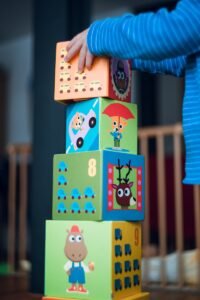The Power of Childhood Plays
By Sean Ra
Childhood plays have an innate power to unlock a child’s imagination and foster their overall development. Play is not merely a frivolous pastime; it is a crucial component of a child’s growth and learning. From boosting imagination to enhancing social skills, play provides numerous benefits that extend far beyond the fun factor. In this article, we will explore how childhood plays contribute to various aspects of a child’s development, including cognitive, social, physical, emotional, and academic domains.
Boosting Imagination Through Creative Play
Creative play holds immense value in a child’s life as it fuels their imagination and creativity. Whether it’s building castles with blocks, creating intricate stories with dolls, or painting vivid pictures, imaginative play encourages children to think outside the box and explore limitless possibilities. By engaging in creative play, children develop problem-solving skills, learn to think critically, and gain the confidence to express themselves artistically.
The Role of Fantasy Play in Cognitive Development
Fantasy play, often referred to as pretend play, plays a vital role in a child’s cognitive development. Through this type of play, children learn to develop and manipulate abstract ideas, understand different perspectives, and solve problems. Whether it’s pretending to be a doctor, a teacher, or a superhero, children engage in role-playing scenarios that enhance their cognitive abilities, such as memory, attention, and logical thinking.
Dramatic play, where children act out different roles and scenarios, is a powerful tool for developing social skills. By taking on various roles, children learn empathy, cooperation, and conflict resolution. They also learn to communicate effectively, negotiate, and share resources. Through dramatic play, children acquire critical social skills that are essential for navigating relationships and developing meaningful connections with others.

The Importance of Outdoor Play for Physical Development
Outdoor play is essential for a child’s physical development. It allows children to engage in physical activities such as running, jumping, climbing, and riding bikes, which promote gross motor skills and coordination. Additionally, outdoor play exposes children to natural environments, providing sensory experiences that enhance their overall development. The fresh air and open spaces inspire exploration, curiosity, and a sense of adventure.
Building Problem-Solving Skills
Play serves as a natural platform for problem-solving skill development. Whether it’s solving puzzles, constructing intricate buildings, or navigating through obstacle courses, children are constantly presented with challenges during play. These challenges stimulate their problem-solving abilities, fostering critical thinking, decision-making, and creativity. Through play, children learn to overcome obstacles, adapt to new situations, and approach problems with resilience and perseverance.
Language Development
Pretend play has a significant impact on a child’s language development. During pretend play, children engage in conversations, express their thoughts and ideas, and practice language skills. By using language to communicate with peers and adults, children strengthen their vocabulary, grammar, and storytelling abilities. Pretend play also encourages children to listen actively, follow instructions, and understand different perspectives, all of which are crucial for effective communication.
Play has a profound impact on a child’s emotional well-being. When children engage in play, they experience joy, laughter, and a sense of freedom. Play provides an outlet for self-expression, allowing children to process emotions, release stress, and develop resilience. Through play, children learn to regulate their emotions, manage conflicts, and cope with challenges. It also offers a safe space for children to explore and understand their feelings, promoting positive mental health and overall emotional well-being.
Play as a Tool for Learning
Contrary to popular belief, play is not antithetical to learning and academic success but rather a catalyst for it. Play-based learning approaches have been proven to enhance cognitive development, creativity, and problem-solving skills. By integrating play into educational settings, children are more engaged in their learning, motivated to explore new concepts, and develop a love for knowledge. Play-based learning also fosters a lifelong love of learning, setting a strong foundation for academic success.
Play offers children the freedom to be independent and express themselves authentically. Whether it’s dressing up in costumes, building imaginary worlds, or engaging in solo play, children have the opportunity to make their own choices and explore their individuality. By fostering independence through play, children develop confidence, self-esteem, and a sense of autonomy. They learn to trust their abilities, make decisions, and take responsibility for their actions.
Executive functioning skills, such as self-control, working memory, and flexible thinking, are crucial for a child’s success in school and life. Play provides an ideal environment for developing these skills. Whether it’s planning and organizing a pretend tea party or strategizing during a game, children engage in activities that require executive functioning. Through play, children learn to manage their impulses, focus their attention, and set goals, all of which are essential for self-regulation and academic achievement.
Tips for Parents
To nurture playful growth in children, parents can provide a supportive environment that encourages play. Create dedicated play spaces, both indoors and outdoors, where children can freely explore and engage in different types of play. Offer a variety of open-ended toys and materials that spark creativity and imagination. Allow unstructured playtime, free from adult direction, to promote independent thinking and decision-making. Finally, join in the play occasionally, showing genuine interest and enthusiasm, as this strengthens the parent-child bond and enhances the benefits of play.
Childhood plays are not only enjoyable for children but also hold immense value in their overall development. By recognizing the importance of play and providing opportunities for children to engage in various types of play, we can unleash their imagination, foster their development, and set them on a path towards lifelong learning and success.

